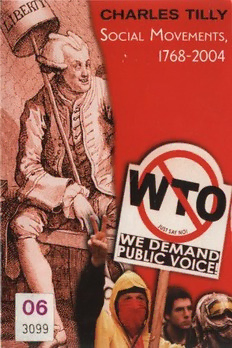
Social movements, 1768-2004 PDF
206 Pages·2004·5.823 MB·English
Most books are stored in the elastic cloud where traffic is expensive. For this reason, we have a limit on daily download.
Preview Social movements, 1768-2004
Description:
Westerners invented social movements during the 18th century, but after that social movements became vehicles of popular politics across the world. By locating social movements in history, prize-winning social scientist Charles Tilly provides rich and often surprising insights into the origins of contemporary social movement practices, relations of social movements to democratization, and likely futures for social movements. Shows how social movements are changing, including the impact of new technologies and globalization. Traces the invention and evolution of social movements with lessons for how social movements could lose their vigor. Explores fundamental questions such as 'How does democratization really occur?' Considers the relation of movements to identity, citizenship, and capital and questions whether social movements are viable in authoritarian states. Students will appreciate Tilly's vivid examples from around the world (including a fantasy of 17th century figures John Wilkes and Samuel Adams trying to discern the effectiveness of 2003 Iraq War demonstrators).
See more
The list of books you might like
Most books are stored in the elastic cloud where traffic is expensive. For this reason, we have a limit on daily download.
